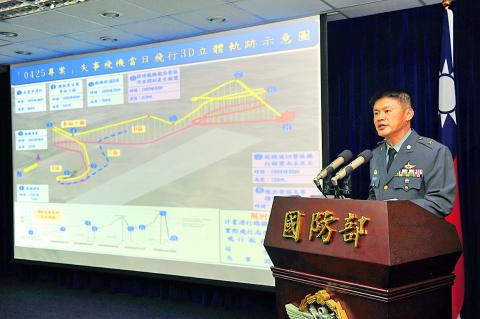The timetable for the nation’s AH-64E Apache attack helicopters to become fully operational has not been affected by a chopper crash in northern Taiwan in April, an army official said yesterday.
“The Apaches will become operational in 2017” as scheduled, Major General Chen Chien-tsai (陳健財), deputy commander of the Republic of China Army Aviation Special Forces Command, said at a news conference to present the conclusions of the army’s investigation into the accident.
The chopper, one of 18 that have been delivered to Taiwan by the US since November last year, was on a training mission on April 25 when it crashed into the top of a three-story residential building in Taoyuan County’s Longtan Township (龍潭), damaging four homes, but causing no serious injuries.

Photo: Lo Pei-der, Taipei Times
Asked whether the incident had affected the delivery schedule of the other 12 Apaches to Taiwan, Chen said it had not.
The fourth batch of Apache helicopters is set to arrive in August, while the final batch is expected to be delivered in October, he said.
They are part of a NT$59.31 billion (US$2.01 billion) order for 30 of the latest Apache model.
The army said environmental factors and human error were found to be the main causes of the helicopter crash and that mechanical failure had been ruled out.
The aircraft was enveloped in cloud during a training mission at an altitude of 120 feet (36.6m) as the cloud ceiling dropped suddenly to below 200 feet, said Major General Huang Kuo-ming (黃國明), deputy inspector-general of the army.
This affected visibility and led to spatial disorientation of the pilot, Major Chen Lung-chien (陳龍謙), a flight instructor who was flying the helicopter at the time, Huang said.
However, he said Chen should have relied on his flight instruments to keep track of the aircraft’s altitude and direction.
Spatial disorientation refers to the inability of a person to determine his true body position, motion and altitude relative to the ground or his surroundings.
Chen and the other pilot on the ill-fated Apache, Lieutenant Colonel Liu Ming-hui (劉銘輝), have been suspended since the incident and have also been receiving counseling to help them recover from the incident, the army said.
They will be able to fly again after a series of evaluations, a process that could take up to six months, Chen said.
On the question of seeking compensation from the US since the Apache helicopter was still under its 18-month warranty, Huang said the ministry was studying that possibility.
Speaking on condition of anonymity, an army official said that although mechanical failure has been ruled out, the US may be seen as responsible for not training Taiwanese pilots properly on how to deal with sudden climate changes, like those that occurred on the day of the crash.
The US and Taiwan are the only two countries that use AH-64E Apache helicopters.

Seventy percent of middle and elementary schools now conduct English classes entirely in English, the Ministry of Education said, as it encourages schools nationwide to adopt this practice Minister of Education (MOE) Cheng Ying-yao (鄭英耀) is scheduled to present a report on the government’s bilingual education policy to the Legislative Yuan’s Education and Culture Committee today. The report would outline strategies aimed at expanding access to education, reducing regional disparities and improving talent cultivation. Implementation of bilingual education policies has varied across local governments, occasionally drawing public criticism. For example, some schools have required teachers of non-English subjects to pass English proficiency

‘FORM OF PROTEST’: The German Institute Taipei said it was ‘shocked’ to see Nazi symbolism used in connection with political aims as it condemned the incident Sung Chien-liang (宋建樑), who led efforts to recall Democratic Progressive Party (DPP) Legislator Lee Kun-cheng (李坤城), was released on bail of NT$80,000 yesterday amid an outcry over a Nazi armband he wore to questioning the night before. Sung arrived at the New Taipei City District Prosecutors’ Office for questioning in a recall petition forgery case on Tuesday night wearing a red armband bearing a swastika, carrying a copy of Adolf Hitler’s Mein Kampf and giving a Nazi salute. Sung left the building at 1:15am without the armband and apparently covering the book with a coat. This is a serious international scandal and Chinese

TRADE: The premier pledged safeguards on ‘Made in Taiwan’ labeling, anti-dumping measures and stricter export controls to strengthen its position in trade talks Products labeled “made in Taiwan” must be genuinely made in Taiwan, Premier Cho Jung-tai (卓榮泰) said yesterday, vowing to enforce strict safeguards against “origin laundering” and initiate anti-dumping investigations to prevent China dumping its products in Taiwan. Cho made the remarks in a discussion session with representatives from industries in Kaohsiung. In response to the US government’s recent announcement of “reciprocal” tariffs on its trading partners, President William Lai (賴清德) and Cho last week began a series of consultations with industry leaders nationwide to gather feedback and address concerns. Taiwanese and US officials held a videoconference on Friday evening to discuss the

PERSONAL DATA: The implicated KMT members allegedly compiled their petitions by copying names from party lists without the consent of the people concerned Judicial authorities searched six locations yesterday and questioned six people, including one elderly Chinese Nationalist Party (KMT) member and five KMT Youth League associates, about alleged signature forgery and fraud relating to their recall efforts against two Democratic Progressive Party (DPP) legislators. After launching a probe into alleged signature forgery and related fraud in the KMT’s recall effort, prosecutors received a number of complaints, including about one petition that had 1,748 signatures of voters whose family members said they had already passed away, and also voters who said they did not approve the use of their name, Taipei Deputy Chief Prosecutor